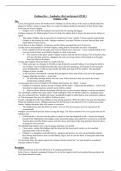Oedipus Rex – Sophocles (first performed 429 BC)
Oedipus – Play
Plot
- Creon, having been sent by his brother-in-law Oedipus to ask the advice of the oracle at Delphi about the
plague in Thebes, returns to report that it is a result of religious pollution (murderer of their former king
Laius has never been caught).
o Oedipus vows to find the murderer and curses him for causing the plague.
- Oedipus summons the blind prophet Tiresias for help who admits that he knows the answers but refuses to
speak.
o This angers Oedipus who accuses him of complicity in Laius’ murder. Tiresias angrily responds that
Oedipus is the criminal he seeks. Oedipus assumes Creon paid Tiresias to accuse him and they both
argue before Tiresias leaves.
- Creon arrives to face Oedipus’ accusations and the chorus persuade him to let Creon live.
- Jocasta arrives and attempts to comfort Oedipus, telling him he should take no notice of prophets.
o Gives example of oracle she and Laius received which never came true – Laius would be killed by his
own son. Instead Laius was killed by bandits at a fork in the road.
The mention of the place causes Oedipus to pause and ask for more details, first of the place then
of Laius. He then sends for a shepherd, the only surviving witness of the attack to be brought
from his fields to the palace.
- Jocasta asks Oedipus what the matter is, and he tells her:
o Many years ago, at a banquet in Corinth, a man drunkenly accused Oedipus of not being his father’s
son. Oedipus went to Delphi and asked the oracle about his parentage and instead of answering the
oracle prophesied he would one day murder his father and sleep with his mother. This prompted
Oedipus to leave Corinth.
o In his travels he encountered a carriage that attempted to drive him off the road and in the argument
Oedipus killed the travellers – at this fork.
He still holds out hope that he was not Laius’ killer, because Laius was said to have been
murdered by multiple robbers.
- A messenger arrives from Corinth to tell Oedipus that Polybus, his ‘father’, is dead.
o Oedipus is overjoyed, because he can no longer kill his father – disproving the prophecy – but he still
fears that he might somehow commit incest with his mother.
Eager to please him the messenger tells him not to worry because Merope is not his real mother.
- The messenger explains that years earlier, while tending his flock on Mount Cithaeron, a shepherd (same
one who witnessed Laius’ death) from Laius’ household brought an infant that he was instructed to dispose
of. The messenger then gave the child to Polybus to raise.
- Jocasta, realising the truth, begs Oedipus to stop asking questions. When he refuses she runs into the palace.
- When the shepherd arrives, Oedipus questions him but he begs to be allowed to leave without answering
further. Oedipus threatens him with torture or execution.
o The shepherd says that the child was Laius’ own son who Jocasta gave up to be exposed on the
mountainside.
- Oedipus curses himself and fate before leaving the stage. The chorus laments how even a great man can be
felled by fate.
o Following this, a servant exits the palace to speak of what has happened inside – Jocasta has hanged
herself in her bedchamber and Oedipus (who entered the palace and asked for a sword so he could kill
Jocasta) discovered the lifeless queen, took her down, and removed the long gold pins from her dress
to gouge his own eyes out.
- The blinded king Oedipus now exits the palace and begs to be exiled.
o Creon enters, saying that Oedipus shall be taken into the house until oracles can be consulted
regarding what is best to be done.
o Oedipus’ two daughters (and half-sisters), Antigone and Ismene, are sent out and Oedipus laments
their having been born to such a cursed family, begs Creon to care for them. Creon agrees and sends
Oedipus back in.
- On the empty stage, the chorus repeats the common Greek maxim that “no man should be considered
fortunate until he is dead.”
Reception
- Took second prize in the City Dionysia in its original performance.
- In his Poetics, Aristotle considered Oedipus Rex to be the tragedy which best matched his prescription for
how drama should be made.
, - “No other [play] shows an equal degree of art in the development of the plot [and] subtle drawing of the
characters.” – Richard Claverhouse Jebb
- Kitto interprets the play as Sophocles’ retort to the sophists, by dramatizing the situation in which humans
face underserved suffering through no fault of their own, but despite the apparent randomness of the events,
the fact that they have been prophesied by the gods implies that the events are not random, despite the
reasons being beyond human comprehension.




